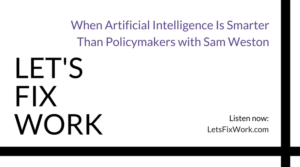 Sam Weston is attempting the impossible: trying to educate our lawmakers about technology and its effect on the workforce. Okay, maybe it’s not impossible, but so far, it’s been an uphill battle as automation and artificial intelligence have continued to take jobs from people who need them. There’s no support for those people, and Sam’s mission is not just to raise awareness; he aims to help those lawmakers by giving them context with awareness, and a plan to make things better.
Sam Weston is attempting the impossible: trying to educate our lawmakers about technology and its effect on the workforce. Okay, maybe it’s not impossible, but so far, it’s been an uphill battle as automation and artificial intelligence have continued to take jobs from people who need them. There’s no support for those people, and Sam’s mission is not just to raise awareness; he aims to help those lawmakers by giving them context with awareness, and a plan to make things better.
In this episode:
-Sam was born in New Zealand and began his career in politics there, but it wasn’t long before he came to the US to become a political consultant. From there, he stepped into PR and then into an Internet agency where he participated in the early days of the Internet and saw its impact on business.
-The Internet has been great for business. We all know this. But there’s a hidden truth that no one wants to talk about. Businesses have been growing but it’s at the expense of employees, and the Internet explosion threw fuel on the fire. Consider: Facebook changed the world, but have all the changes been good?
-No doubt you’ve seen a million different promises that if you fix THIS ONE THING, you’ll fix work for yourself. It’s the perfect marketing pitch. But according to Sam, fixing one problem won’t fix all of work. In fact, a lot of what people say is broken about work isn’t really broken at all. Case in point: communication.
-So, if all these problems are just symptoms, then what is the actual problem? It’s simple: no one is fixing work for employees. All the consultants, programs, and courses are trying to fix work for the company instead. Most employers are happy with the way things are and Sam reveals what’s really on their minds when they think of fixing work. If you’re a cynic, you’ll agree.
-As always, there’s an underlying problem here: the interests of a company are its shareholders. And that interest will always be diametrically opposed to the interest of the employee who asks, ‘how can I get paid what I’m worth?’ A different sort of problem for those who don’t struggle to earn enough to live is finding purpose and meaning in their work. They wonder if they’re wasting their lives.
-The amount of change rushing toward the workforce is massive. With the advent of AI and technology, more and more jobs will be disappearing. Importantly, this second rush of automation won’t just affect automotive industries and factory workers; it’s the white-collar workers who will bear the brunt of this coming change. Laurie asks a scary question, ‘is the future of work NOT work?’ Sam believes the jury is out on whether the number of jobs AI creates will be more or less than the number of jobs it destroys. But here’s the parallel issue: no one is talking about the jobs it will destroy.
-We already don’t have a great track record of supporting people whose jobs were either outsourced or taken by robots, and it brings up an interesting discussion around politics (of course) and how the Democratic party has become more about the status quo instead of for the working class. You’ll want to hear what Sam and Laurie have to say about political capital and what it means for change. Do you agree?
-With all the gloom and doom of business interests and the AI tidal wave that’s about to hit, we have to wonder what’s standing in the way of truly fixing the systemic problems of work? Sam’s response is so dead-on that you’ll be nodding along: our policymakers are technology-illiterate. They don’t understand the problem or how to fix it.
-According to Sam, we are drowning in awareness of problems, but we aren’t drowning in change. This is what he’s dedicated himself to fixing. If we can present the problems that technology brings, give it context, and make it matter to policymakers, that is a HUGE step forward in heading off the issues before they arise.
-Another problem with political leaders is that they’re having the same arguments they’ve been having for nearly 60 years. They lack a real vision for the future, so their policies don’t encompass that. Whether you like Elon Musk or not, the man knows how to look toward the future, and both policymakers AND business owners can learn from him.
-It might not only be up to policymakers and business owners to create a vision for the future. In the past, families like the Rockefellers and Carnegies have done amazing work, so where are the new millionaires and billionaires who are creating real, positive change in our world? (If that’s you, Sam has some pointed advice that can help you make almost immediate change and why you shouldn’t focus on foundations.)
Find Sam Online:
Sam Weston’s Website
Twitter
LinkedIn
Essence Global on Facebook
You must be logged in to post a comment.